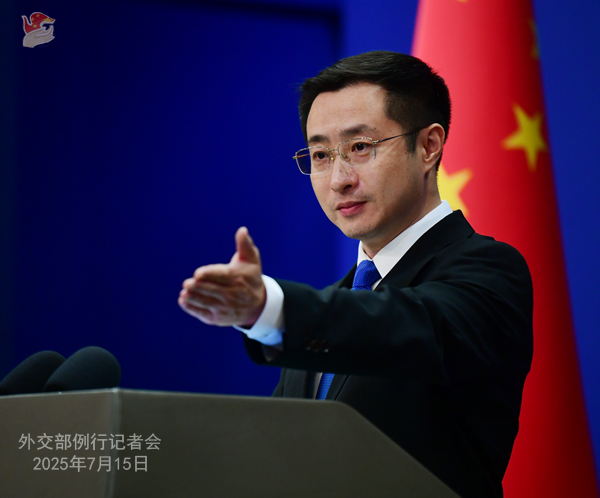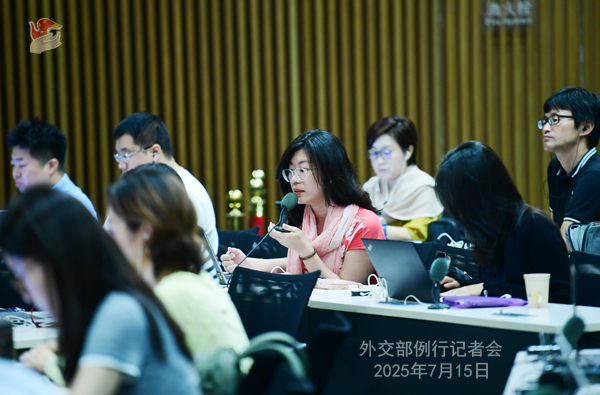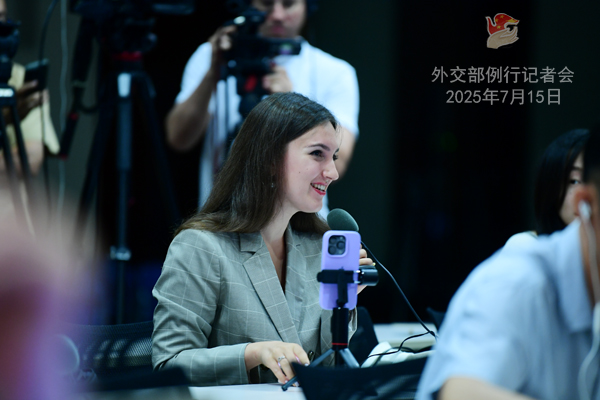
CCTV: Cooperation between China and ASEAN countries has made good progress recently. The smart port at Friendship Pass on the border between China and Viet Nam started joint commissioning and testing. Chinese company completed the Genting Tunnel on the East Coast Rail Link in Malaysia. Some media, however, said that Southeast Asian countries, including ASEAN countries, face a “China Shock,” which could disrupt local economic and social development. What’s your comment?
Lin Jian: China and ASEAN countries have similar development philosophies and goals and shared interests. In designing cooperation with ASEAN countries, we always make sure that it responds to their desire of growing the economy and delivering better lives for their people, and that our cooperation is always based on equality and mutual benefit. Recent years have seen many cooperation highlights in emerging sectors such as e-commerce and digital tech. China and ASEAN countries have also achieved a lot in advancing regional economic integration and facilitating cross-border travel. China and ASEAN have affirmed the completion of consultations on the China-ASEAN Free Trade Area 3.0. The two sides are engaged in high-quality implementation of RCEP, and expanding the common market. Chinese cross-border e-commerce platforms are working with their Southeast Asian counterparts to introduce more competitive products to the market. Chinese businesses are building 5G networks, bringing fiber optics to households and enabling digital transformation in Southeast Asian countries. With the “Lancang-Mekong visa” and the “ASEAN visa” coming into effect, travel is further eased between China and ASEAN countries.
With China’s well-established industrial chain in manufacturing, it has kept the global industrial and supply chains stable, cut local production and living costs and turbocharged technological advancement and industrial upgrade in China’s partner countries through industrial cooperation. China has a mega-sized market. We are implementing the strategy of expanding domestic demand and special initiatives to boost consumption. The vast potential of domestic demand will be unleashed, bringing more opportunities for our neighborhood and the rest of the world.
At the recently concluded China-ASEAN Foreign Ministers’ Meeting, ASEAN countries said they have the most dynamic and fruitful cooperation with China. Not only is this a recognition of the cooperation, but also an echo of China’s commitment to fostering an amicable, secure and prosperous neighborhood, the principle of amity, sincerity, mutual benefit and inclusiveness, and a vision for a shared future. China will continue to work with ASEAN countries for robust momentum for common development and prosperity.
Reuters: Paraguay’s president has said that the country is preparing to receive Lai Ching-te next month. Lai is also expected to visit Belize. He could very well make stopovers in the United States during his transit. Has China already warned the U.S. not to allow Lai to transit and if so, what was the U.S.’s response to that?
Lin Jian: On the so-called “diplomatic ties” between Paraguay and China’s Taiwan region, China has made its position clear more than once. The one-China principle is a basic norm in international relations and an international consensus. Upholding the one-China principle is the right thing to do. It is where the arc of history bends and public opinion trends.
People from various sectors of Latin American countries, including from Paraguay, have visited China in recent years. There is a widely shared view among them that Paraguay needs to stop turning its back on China, stop being an outlier of the international community, and recognize the one-China principle and make a change in its relations with China sooner rather than later. We urge the current administration of Paraguay to stop going against the trend of the times, and reject being manipulated and used by “Taiwan independence” forces. It needs to listen to the aspiration of the people of Paraguay, and make the right choice that truly serves the fundamental and long-term interests of its people at an early date. We also hope that relevant Latin American and Caribbean countries will see the prevailing trend, act prudently on Taiwan-related issues, and join the big family of China-LAC friendship and cooperation at an early date.
Regarding the possible stopover in the U.S. you mentioned, China firmly opposes any form of official interactions between the U.S. and China’s Taiwan region. We oppose any visit to the U.S. by leaders of the Taiwan authorities for whatever reason or under whatever pretext. The U.S. should not in any way aid or abet “Taiwan independence” separatists and their separatist activities. The U.S. needs to fully understand the high sensitivity of the Taiwan question, abide by the one-China principle and the three China-U.S. joint communiqués, and handle the Taiwan question with extra prudence.
RT TV: Russian Foreign Minister Sergey Lavrov is paying a visit to China. Could you brief us on his visit? What’s your comment on it?
Lin Jian: President Xi Jinping and Foreign Minister Wang Yi have met with Russian Foreign Minister Sergey Lavrov respectively, and the readouts have been released. China and Russia maintain close and smooth communication at all levels, which is conducive to the timely implementation of the common understandings reached by the two presidents, promoting each other’s development and revitalization and jointly addressing the challenges in this volatile and changing world.
Global Times: It’s reported that on July 11, U.S. Secretary of State Marco Rubio announced on social media sanctions against Cuban President Miguel Díaz-Canel, Defense Minister Álvaro López Miera and Interior Minister Lázaro Álvarez Casas for human rights violations, and their access to visas will be restricted. This is the first time that the U.S. sanctions Miguel Díaz-Canel. What’s China’s comment?
Lin Jian: We noted relevant reports. China firmly opposes the U.S. using human rights as a pretext to wrongfully impose unilateral sanctions, and interfere in Cuba’s internal affairs. Over six decades of sweeping U.S. blockade and sanctions have devastated the lives of the Cuban people. The sanctions should be lifted at once, not redoubled. China firmly supports Cuba in pursuing the development path suited to its national conditions and safeguarding its sovereignty and dignity. We urge the U.S. to immediately lift the blockade and sanctions on Cuba, and remove it from the list of “state sponsors of terrorism.”
Let me stress that if the U.S. truly cares about human rights, it should reflect on its own human rights violations at Cuba’s Guantanamo Bay and elsewhere in the world.

AFP: Japan said yesterday that China’s military activity in the region could seriously impact Japan’s national security. Does China have a response to this comment?
Lin Jian: I think you are referring to the Defense of Japan 2025 that was just released. The white paper reflects a wrong perception of China, interferes in China’s internal affairs and peddles the false “China threat.” China strongly deplores and firmly opposes this, and has protested with Japan.
Taiwan is an inalienable part of China’s territory. The Taiwan question is purely China’s internal affair, and how to settle it is a matter for the Chinese ourselves. China is committed to peaceful development. China’s national defense policy is defensive in nature, and our defense development and military activities are legitimate and justified. China’s military cooperation with other countries is fully consistent with international law and international practice.
This year marks the 80th anniversary of the victory of the Chinese People’s War of Resistance Against Japanese Aggression and the World Anti-Fascist War. We urge Japan to deeply reflect on its historical crime, draw lessons from history, and stop finding pretexts for its military buildup by talking up “tensions” in the neighborhood and issues related to China. It needs to avoid further losing the trust of its Asian neighbors and the international community.
Reuters: U.S. President Trump has threatened to impose 100 percent tariffs on Russian goods and also secondary sanctions on countries buying Russian oil unless Russia agrees to a peace deal within the next 50 days. Does the ministry have any comment on this? American Senator Lindsey Graham has threatened China and other countries with 500 percent tariffs and other punitive measures if they continue trading with Russia. Are you concerned about the pressure from Washington? (Similar question from RT TV)
Lin Jian: China’s position on the Ukraine crisis is consistent and clear. We always believe that dialogue and negotiation is the only viable way out of the crisis. China firmly opposes any illicit unilateral sanctions and long-arm jurisdiction. Tariff wars have no winners. Coercion and pressuring will lead nowhere. We hope parties will help create the atmosphere and conditions for a political settlement of the Ukraine crisis, and act in ways conducive to promoting talks for peace.
RIA Novosti: A follow-up on the Japanese defense ministry report. It also says that Tokyo is deeply concerned about Russia’s military activity in the Far East and its strategic partnership with China. The Ministry particularly noted the growing frequency of military interaction between the two countries, including joint exercises and joint patrols. What’s China’s comment on this?
Lin Jian: I just made clear China’s position on Japan’s defense white paper. Let me reiterate that China is committed to peaceful development. China’s national defense policy is defensive in nature, and our defense development and military activities are legitimate and justified. China’s military cooperation with other countries is fully consistent with international law and international practice.
Reuters: The European Commission’s VP Teresa Ribera has told journalists that China said it is committed to a new climate target that is comprehensive, and that China will come up with concrete updates on that this autumn. Could we confirm if China has set such a timeline for finalizing its climate targets? Also, just following up on the dialogue with the EU on climate that just concluded, about the joint declaration that the EU mentioned, are China and the EU on track to have a joint declaration during the summit of the leaders?
Lin Jian: You mentioned the visit to China by Executive Vice-President of the European Commission Teresa Ribera. Chinese Vice Premier Ding Xuexiang held the sixth China-EU High-Level Environment and Climate Dialogue jointly with Teresa Ribera. The readout has already been released, which you may refer to. I would like to stress that China actively implements the UNFCCC and its Paris Agreement. We are fully committed to green and low-carbon development. No matter how the world may shift, or how other countries may adjust their policy, China will not deviate from its goal of carbon peaking by 2030 and carbon neutrality by 2060. President Xi Jinping stated at the Leaders Meeting on Climate and the Just Transition in April this year that China will announce its 2035 NDCs covering all economic sectors and all greenhouse gases before the United Nations Climate Change Conference in Belém. I’d refer you to competent authorities for specifics.
On the China-EU Summit, I have no information to share at the moment.
Bloomberg: Today NVIDIA announced that it will be allowed to start selling its lower-grade AI chips to China because the U.S. government will allow them to do so. Can you respond please?
Lin Jian: Usually, we do not comment on business activities. I would like to point out that China’s opposition to politicizing, instrumentalizing and weaponizing tech and trade issues and malicious attempts to blockade and keep down China is consistent and clear. These actions will destabilize the global industrial and supply chains, and serve no one’s interests.








